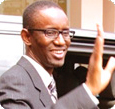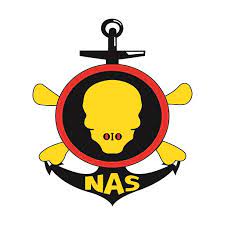By Reuben Abati and Kingsley Osadolor
Mallam Nuhu Ribadu, until recently, Chairman of Nigeria's Economic and Financial Crimes Commission (EFCC) is our Man of the Year, 2007. The context of his selection is worth defining. The year 2007 was a turbulent year for Nigeria in which both the Nigerian people and the government grappled with the issues of transition politics and misgovernance. This was a year in which eight years after the country's return to democracy, the average Nigerian still waited in vain for so-called democracy dividends. The term, "democracy dividends," is defined in terms of the translation of democratic governance into concrete benefits in the life of individuals and their communities. Even more challenging in the course of the year was the continuing threat of violence and actual violence in parts of the country, which pointed to a spectre of creeping anarchy, the likelihood of implosion in places and a possible reign of lawlessness.
The Niger Delta remained especially volatile with reports of kidnappings, and the demand for and nervous payment of ransom in exchange for human life. In other parts of Nigeria, the people groaned under the burden of armed robbery, kidnappings, rape, religious violence, and a collapsed public infrastructural system. These were veritable signals of the devaluation of the dignity of the human person. There was, in its face, a desperate craving, preference so to speak, for the rule of law and the need to check the reigning culture of impunity as a minimum guarantee for transforming Nigeria into a more just, secure and equitable society. One major area in which this aspiration was reflected was in the activism of the judiciary which helped to insist on the supremacy of the rule of law in some of the cases that came before the courts.
Notably, the judiciary weighed against the corrupt practices of politicians during the April 2007 elections and handed down judgements, for example in the Peter Obi case in Anambra, the Amaechi case in Rivers State and in tribunal decisions in the elections in some of the states including Kogi, Ogun, and Kebbi which helped to put a fence around the criminal conduct of the Nigerian professional politician with a crooked bent of mind. These rulings also pointed to the need for far-reaching electoral reforms and the transformation of Nigeria's political party system.
But it has always been obvious, and this much was clear in the course of the year, that judicial pronouncements alone are not enough to check the misconduct of both public and private persons. More than anything else, it is the conduct of public servants that goes a long way in sabotaging the polity. And nothing has best threatened the cause of governance and development than the corroding attribute of corruption. Nigeria, in spite of her oil wealth, is a poor country with about 70 per cent of its 140 million people living on less than one dollar per day, far below the poverty line. Nigeria is also listed among the 20 poorest countries in the world, with a low human development index. .
The people's agony and poverty are further deepened by the lack of accountability in governance. In the circumstance, a mechanism for dealing with corruption, the outright theft of the country's resources and a deep-rooted love of financial scam, had become a matter of urgent national importance. Corruption was so rampant in all institutions of government, it created an image crisis for the country at the international level, as indicated by the country's abysmal rating by Transparency International and other national integrity watchdogs. It was always clear to discerning observers, therefore, that the decades of corruption which had assumed a cultural hue would require dedication, commitment and force of character in driving a required countervailing mechanism.
At the dawn of the Fourth Republic in 1999, the then President, Olusegun Obasanjo had announced a campaign against corruption as one of the major planks of his administration, claiming that there would be no sacred cows. The government then created an Due Process Office in the Presidency, it also introduced the Corrupt Practices and Related Offences Act of 2000, but it wasn't until that government's second term with the creation of the Economic and Financial Crimes Commission (EFCC) in 2003 that the promised war against corruption began. Before the EFCC, there had been other mechanisms and statutes for dealing with corruption, but these were largely ineffectual.
They include the creation of the Independent Corrupt Practices Commission in 2000, and before this, the Miscellaneous Offences Act of 1985, the Foreign Exchange (Miscellaneous) Offences Act of 1995, the Advance Fee Fraud and Related Offences Act of 1995, the Failed Banks (Recovery of Debts) and Financial Malpractices in Banks Act of 1996 and the Money Laundering Act of 1995 (now repealed by the Act of 2004). The missing link was the lack of commitment and the duplicity of previous administrations, mostly military, which initiated most of these statutes. The Nigerian military contributed in no small measure to the institutionalization of corruption as a national ethic.
With the arrival of the EFCC, there was a change of momentum and direction, and renewed vigour in the pursuit of the anti-corruption war. The principal driving force was the Chairman of the EFCC, Mallam Nuhu Ribadu, who is our Man of the Year. Ribadu was drafted from the Nigeria Police Force to head the EFCC. A product of the Faculty of Law of Ahmadu Bello University, Zaria, he was born on November 11, 1960. He graduated from the Nigerian Law School in 1984 and was called to the Nigerian Bar. He also obtained a Masters of Law degree from Ahmadu Bello University and subsequently joined the Nigeria Police Force where he rose to become an Assistant Commissioner of Police and head of the Legal and Prosecution Department.
Although he had distinguished himself as a police officer, it was his appointment as Chairman of the EFCC in 2003 that brought him to public attention. In a country where policemen are generally regarded a corrupt and unreliable, Ribadu immediately proved to be of a different stock. Another police officer might easily have been compromised, but Ribadu took his assignment with the doggedness of a missionary. He was resolute, determined and unrelenting. By 2004 and 2005, he was already being nominated as Man of the Year by an appreciative media and other publics. There is little doubt however that the year 2007 marks a watershed in the activities and operations of the EFCC.
Four years after the commencement of operations, the EFCC by 2007 had already acquired the confidence and the reputation it needed to do its job. Invariably though, the credit goes to Ribadu along with members of his team. It is often said that the major issue about the EFCC should not be the person or persona of its former Chairman, Nuhu Ribadu, and that proper emphasis ought to be placed on the strengthening of the EFCC as an institution and the building of a national integrity framework that is sustainable and broadly owned. We agree. However, it is also a fact as, Hubert Humphrey, former US Vice President deposed, that "one individual can make a difference". Nuhu Ribadu was one man who made a great difference in the anti-corruption campaign and the erection of a legacy of integrity. He has provided quality leadership and he has shown that institutions can perform if properly led and if properly supported. Significantly, the passion with which he took his assignment, the courage that he demonstrated, his disregard for power and orthodoxy provided the momentum that kept the EFCC and its work on the national map.
In 2007, Ribadu and his team sustained an established pattern of activism against economic and financial crimes. Economic rimes as defined by the EFCC Act in Section 46, covers crimes such as the embezzlement of public funds, fake currency trafficking, drug trafficking, money laundering, tax evasion, dumping of toxic wastes and smuggling and all such acts which may have a damaging effect on the national economy. Financial crimes on the other hand, refer to advance fee fraud, cyber crime, capital market fraud, currency trafficking and counterfeiting, and any such attempt to earn wealth illegally. The EFCC under Ribadu's watch covered the field with the ferocity of a hungry watchdog. It invited prominent bankers for questioning, senior public officers too and it gave trouble to advance fee fraudsters. At a time there were over 500 persons in its cells, while it prosecuted over 150 cases in court.
In the run up to the elections, Nuhu Ribadu warned then sitting Governors that anyone among them who had stolen public funds, will be arrested immediately they left office. Indeed, he announced that 16 state Governors and two former Governors were being investigated and would be picked up by his men. He did not quite keep to this promise, but it was generally believed that the speed with which many of the former Governors fled abroad as soon as they handed over power on May 29, was not unconnected with Ribadu's threat. Some of the EFCC's major achievements in 2007, included the jailing of a number of bankers who had defrauded their own customers, or engaged in money laundering. Notorious "419" kingpins were sent to jail including one Ade Bendel who had defrauded an Egyptian General, Ali Abdul Aliah, to the tune of about $800, 000.
There was also the Wilbros Scandal. Wilbros Group Incorporated, an American Company had allegedly paid a bribe of over $6 million to officials of the NNPC, the PDP, and Shell Petroleum to facilitate a gas pipeline contract. The EFCC promptly invited all the named persons for questioning. But perhaps the cumulative effect of the work of Ribadu's EFCC could be seen in how it succeeded in criminalizing illicit wealth. In a country where questions are hardly asked about the source of individual wealth, the EFCC impelled the people to adopt a change of attitude.
A common refrain was that "the fear of Ribadu's EFCC is the beginning of wisdom". Naira plunking at social parties, lavish donation of money at public events became reduced. The EFCC also forged international linkages with similar organizations in other parts of the world, making it difficult for thieves of public funds to repatriate their stolen funds abroad or launder the same monies through third parties. Both the former Inspector General of Police, Tafa Balogun and former Governor of Bayelsa Sate, Diepreye S. Alamiyeseigha were prosecuted and jailed, even if some people consider their conviction a slap on the wrist, a matter that is beyond the purview of the EFCC.
In addition, the EFCC arrested, paraded and commenced the prosecution of former Governors: Saminu Turaki, Orji Kalu, Chimaroke Nnamani, Joshua Dariye, James Ibori, Ayo Fayose and Jolly Nyame who only a few months earlier had been Lords of the Manor in their respective states, protected by Section 308 of the Constitution which granted them immunity form prosecution while in office. The arrest and arraignment of these former Governors helped to send a clear message about the limits of immunity. The point was well made that no one would again be allowed to mismanage public resources. Apart from the hounding of corrupt public officials, the EFCC also adopted other measures including plea bargaining in pursuit of its mandate.
With Ribadu in charge, the EFCC brought renewed respect to Nigeria: the country received better rating on the international corruption index. Before the creation of the EFCC in 2003, the Paris-based Financial Action Task Force had blacklisted Nigeria as a destination for investment capital. With the EFCC in place and its proven vigilance, more investors developed confidence in the Nigerian system, the evidence of which was borne out by the increased robustness in the banking sector and the capital market. Ribadu was resolute and courageous. He was not only passionate, he was a great apostle of his own task.
In a speech delivered at an Academic Staff Union of Universities Seminar at the University of Ibadan in February 2007, he had summarized the seriousness of the anti-corruption war in the following telling words: "Let us not mince words today, my friends, our country sways at the edge of a fundamental ethical turning point in which the unspeakable level of grand corruption runs the risk of canceling our democratic future, the foundations of our economy and the indeed the social fabric of our nation. From the direct experience of the data I have at my disposal I have no doubt in mind that this is a ticking time bomb situation and we have a monumental emergency with severe tragic proportions on our hands. Just look at it this way: by diverting resources from intended public like in education to illegitimate private benefit, corrupt public officials cause massive human deprivations, gravely affecting the livelihoods of the poor and weaker members of our community who are the most vulnerable. You can duplicate this problem in many dimensions to see the point I am making that corruption is at the heart of most problems of our time, especially regarding undermining the protection and promotion of human rights and especially inhibiting the abilities of the poor…."
But in his anti-corruption zealotry, Ribadu also turned out to be garrulous, speaking more often than he should, sounding far too political and slandering people in the process. In spite of his achievements, he also gave the impression in the run-up to the elections that he was a willing agent of former President Olusegun Obasanjo who was playing dubious tenure extension politics, and who had no scruples about punishing anyone who opposed that agenda or who showed any sign of independence. Long before the eve of the elections, the EFCC had been regarded as a tool in the hands of the Obasanjo administration, an administration that was well known for its vindictiveness.
This appeared to be the case, for example, when the EFCC published a strange list of persons whom it deemed unqualified to stand election in April because of as yet unproven allegations of corruption. It was a misstep that impugned the integrity of the EFCC leading critics to further charge that the Commission was lending itself to possible or actual political manipulation. One of the names on the list in question was that of the then Vice President, Atiku Abubakar, who had personal differences with the President, whom the Presidency had tried every trick in the books to discredit but whose innocence was repeatedly affirmed by the courts of law.
Another name on Ribadu's hit list was that of Dr Olanrewaju Tejuoso, whose only crime was that he had the effrontery to seek to contest the same seat that the President's daughter wanted. Former President Olusegun Obasanjo further exposed the EFCC to public skepticism when on February 3, 2007, at a rally of the ruling Peoples Democratic Party in Akure, Ondo state, he told his audience, that Dr Olusegun Mimiko, a Gubernatorial Candidate of the rival Labour Party and former Federal Minister of Housing, would soon be interrogated by the EFCC. It was an embarrassed Nuhu Ribadu that later retorted that President Obasanjo was merely expressing a personal opinion. Very few persons believed this because before then the EFCC had also got itself involved in the untidy task of contriving the impeachment of state governors by blackmailing members of the Houses of Assembly in the states. This trick was attempted notably in Bayelsa and Plateau states.
Even in its anti-corruption crusade, the Commission headed by Ribadu focused more on state Governors such that any unwary observer would be misled into thinking that the two other levels of governance were corruption-free. But that will be misleading as there are 774 local governments in the country and the abysmal failure of this tier of government is traceable in large part to incompetence and corruption, and if the EFCC were to beam its searchlight on that level, perhaps some sanity will be restored and hopefully, greater dividends of democracy will accrue from the local councils. But nothing appears to compromise the integrity of the EFCC more than its curious silence on unsavory occurrences at the Federal level of governance.
The Federal Government rakes in about 53% of the Federation Account each month, and yet the state of infrastructure nationwide, the parlous state of the Police and indeed the Armed Forces, and the decay in Federal Universities point unmistakably to the questionable husbandry of those monies that flow into the Federal coffers every month. Assuming the EFCC needed tips on how to proceed against the Federal Government, it needed only to have adverted its gaze to the billions of Naira allegedly budgeted for and spent on Federal Highways, nationwide.
By one account, the Federal Government spent some N450 billion on Federal roads between 1999 and 2007. The state of these roads is a clear manifestation that it was not money well spent and questions ought to have been asked. Similarly, billions of Naira had been sunk into the power sector but Nigeria and Nigerians continue to remain in darkness, illuminated partially by the power generated through private effort. Furthermore, questionable deals over the privatization programme have begun to come to light in recent times, but these would seem to be off the EFCC radar.
These lamentations do not in the end detract from the remarkable achievements of the EFCC and Nuhu Ribadu, who served as its leader, to great applause. If the EFCC were not as worthy, it might never have been bale to muster the enormous public support that it had enjoyed in at least two incidents recently. The first was the altercation between the Attorney General of the Federation (AGF), Michael Aondoakaa and the EFCC by which the AGF sought to invoke his Constitutional powers with regard to criminal prosecution with the intended result that both the EFCC and the ICPC will be wholly subordinated to the off ice of the Attorney General of the Federation.
The ensuing public outcry and support for the independence of the EFCC was a vote of confidence in Nuhu Ribadu and his team. That public support has lingered as the EFCC attempted to bring to justice alleged corrupt former and serving public officials, and only in the past week, the public has again risen in stout defence of Nuhu Ribadu who is being shunted aside from his desk as Chairman of the Commission by being sent on a one-year course at the National Institute of Policy and Strategic Studies (NIPSS), before the expiration of his renewed tenure of office.
It must be understood that the support for Nuhu Ribadu and the EFCC is more with regard to the outcome of their exertion in the anti-corruption crusade. Nigerians dread a relapse into the culture of financial impunity and economic sabotage. The anti-corruption campaign is central to the sustenance of our democracy. Its abandonment or a reduction of the momentum that we have seen can only further empower the criminals in the environment and their collaborators in high and low places. Ribadu's ouster need not bring about this unsavory prospect. We think that the way to go is to revitalize the EFCC as an institution and ensure that Ribadu's successor emulates his courage and determination to prosecute the much necessary war against corruption. The government must lend its support in this respect.
It was a most reluctant Ribadu that accepted the study leave that has been imposed on him. But as he takes his exit, he can look back on a period of service as EFCC Chairman and particularly the year 2007, with a feeling of fulfillment and accomplishment. The fraudsters, whom he has put in jail, the corrupt public officials that he has invited for prosecution and who are being prosecuted, may heave a sigh of relief. Some public officials and criminals who had fled abroad to escape the EFCC dragnet are also reportedly on their way back to the country. Government must make it impossible for such crooks and corrupt elements to have the last laugh. The integrity of the Yar'Adua administration rests on what it does with the anti-corruption campaign henceforth.
Dr. Reuben Abati and Kingsley Osadolor wrote this piece forThe Guardian Newspaper.




